Sharon Covert, Tiskilwa, Illinois
When asking a U.S. soybean farmer what his or her priorities are during the planting, growing and harvest seasons, you will likely get a variety of answers.
“Get the soybeans in early.”
“Keep the weeds and pests under control.”
“Get high-quality soybeans harvested on time.”

But no matter how many different answers these farmers give, in the end, they’re all working toward the same goal of providing a stable food supply, both domestically and to partnering international customers.
“Forming partnerships with our international customers is important,” says Sharon Covert, U.S. Soybean Export Council secretary. “Maintaining those relationships is extremely important.”
The U.S. soy industry does this by discovering and meeting customer needs.
“From trade missions, we’ve learned how important sustainability is to our partners,” says Covert, who farms near the northern Illinois town of Tiskilwa, about 125 miles west of Chicago. “These are messages we take home and apply on our own farms so we can leave our land in a better place for the next generation.”
Through practices such as biotechnology, no-till and water conservation, U.S. soybean farmers have shown their dedication to meeting these sustainability demands.
The Coverts have responded by implementing sustainable practices on their own farm.
“We were given a conservation award by the state of Illinois,” she says. “On a recent trip to Taiwan, I was able to show our customers pictures of filter strips by our streams and describe why we might conserve land instead of farming it.”
But farming sustainably means more than being environmentally responsible. It also means being able to provide a safe, reliable and stable food supply.
“We’re reliable,” says Covert. “It seems so simple, but it’s something that we’re committed to providing.”
Reliability comes from not only the consistency with which farmers are growing their soybeans, but also in their means of delivering them.

“Roads, rails, rivers – all these modes of transportation work together and keep us efficient,” says Covert. “Going into the future, we’re working to ensure soybeans are delivered dependably worldwide.”
Another priority is delivering high-quality soybeans.
“High protein and quality are soybean characteristics that we want to deliver,” says Covert. “U.S. soybean farmers are becoming more aware of the quality of the soybeans grown.”
The United States is devoted to continuing research to improve soybean quality. In Covert’s home state of Illinois, there are field programs that test the amino acids and oil content in soybeans by region to better understand how geography affects quality.
“We’ve taken results from these programs to major seed companies and breeders to continue increasing awareness for the importance of both yield and quality,” says Covert.
Implementing sustainability practices and promoting the importance of quality in soybeans is especially important to Covert as she presents these enhancements to those she meets on trade missions.
And as those relationships are nurtured and cultivated, they become even more rewarding.
“I’ve formed personal connections with so many individuals from other countries,” says Covert. “After listening to customers’ wants and needs, it’s been especially gratifying to present the U.S.’s commitment to them in tangible ways, like with the pictures of our sustainable practices on our farm.”
Of course, after this year’s harvest, the United States will have bushels of tangible ways to show its commitment to quality to its partners.
